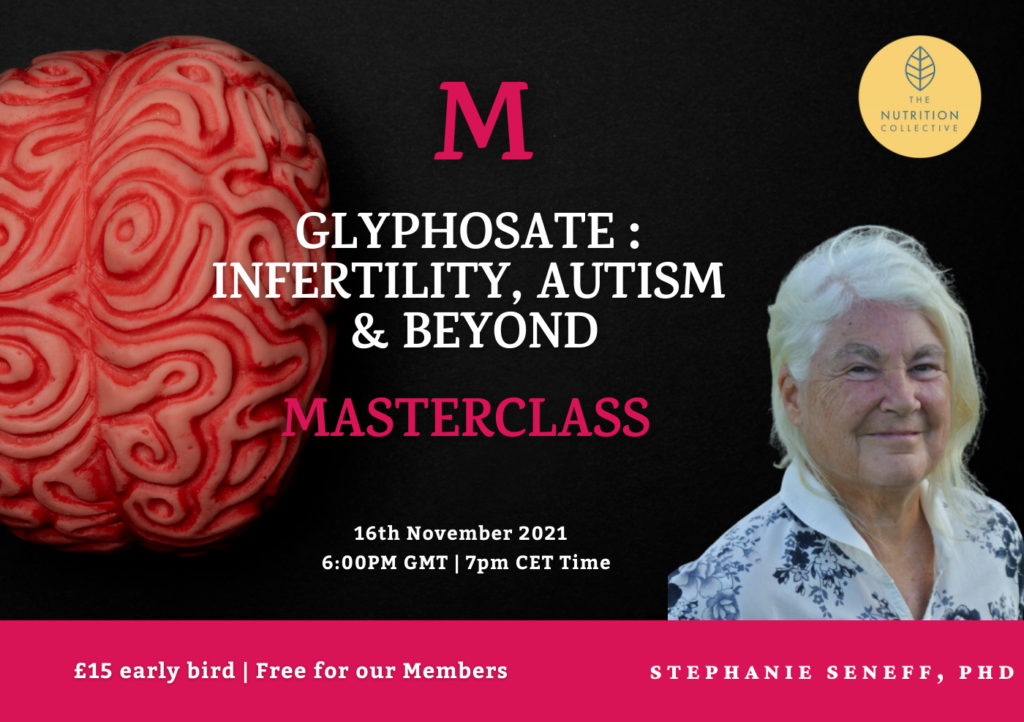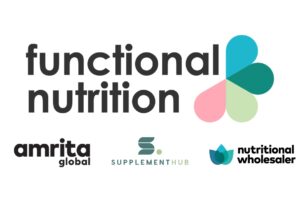Nov 21
Brain
Glyphosate Toxin: Infertility, Autism & Beyond

Glyphosate Toxin: Infertility, Autism & Beyond
With Stephanie Seneff, Phd
Tuesday 16th November
6-7.30pm GMT | 7-8.30pm CET | 1-2.30pm ET time
Glyphosate is widely used in agriculture in the UK, the USA and in most countries around the globe. Its residues are found in our food supply, including, to a degree, organic produce. It’s also found in human urine samples, including those taken from pregnant women.
Glyphosate is proclaimed to be safe because human bodies lack the enzyme to metabolise it. Is it really safe though?
Accumulating evidence demonstrates that this is not the case. It turns out our gut bacteria have the enzymes necessary to metabolise glyphosate and it’s the effects that glyphosate has on our microbiome that largely mediate its harmful impact on the human body. Glyphosate has been found to act as an endocrine disruptor capable of inducing epigenetic changes, even in small doses. It’s also been declared a probable human carcinogen. The question is, how much evidence do we need to gather to see it banned?
Stephanie Seneff, PhD has dedicated her life to raising awareness of the impact of glyphosate on the human body. Her research initially focused on the role of glyphosate in the pathogenesis of autism. Later she studied its contribution to autoimmunity and cancer development. She is “a scientist on a quest to reveal the truth” and we are are glad to be able to support her on her mission.
Learning Outcomes:
Join us for a unique Masterclass to learn about:
- The impact of glyphosate on human microbiome and the consequences of the shift in its composition
- The connection between short chain fatty acid imbalance induced by glyphosate and autism
- Glyphosate as hormone disruptor and the link with PCOS and infertility
- The small steps we can take to minimise the effects of glyphosate on human health
Join Stephanie Seneff PhD, who has authored over three dozen papers published in peer-reviewed journals discussing the effects of toxic exposures and nutrient deficiencies on human health. She is a sought after speaker with a rare talent of explaining complex biochemical and metabolic pathways in a crystal clear manner.
£15 EARLY BIRD. FREE FOR OUR MEMBERS. Email [email protected] for more information
CPD accreditation for this webinar will be rewarded.
Once registered, you will receive three reminder emails – one a week before the webinar, one a day before and one on the day of the webinar. All our webinars are recorded – you will be sent a link to the recording along with all the educational material, presentations, handouts and CPD approximately 24 to 48 hours after the event.
Speaker
Stephanie Seneff
Senior Research Scientist, PhD & Author
Stephanie Seneff is a senior research scientist at MIT’s Computer Science and Artificial Intelligence Laboratory. She has a bachelor’s degree in biology with a minor in food and nutrition, and a master’s degree, an engineer’s degree, and a PhD in electrical engineering and computer science, all from MIT. For most of her career at MIT she was involved in the development of technology to support natural human-computer communication through spoken language. Since 2010, Dr. Seneff has shifted her research focus toward the effects of drugs, toxic chemicals, and diet on human health and disease, and she has written and spoken extensively, articulating her view on these subjects. She has authored over three dozen peer-reviewed journal papers on topics relating human disease to nutritional deficiencies and toxic exposures. She has focused specifically on the herbicide glyphosate and the mineral sulfur. Dr. Seneff splits her time between Hawaii and Massachusetts.
Brain Events
- 5th Dec - The Ultimate Hormones Conference 2024
- 21st Nov - From Anxiety to Deep Sleep: A deep Dive into CBD with Dr. Dorninger
- 16th Oct - Detoxification and Metabolic Fitness for Longevity
- 3rd Oct - Decoding Cognitive Health: APOE Gene, Rem Sleep & Learning
- 24th Sep - Lion’s Mane Unleashed: Transformative Insights on Bioavailability, Potency, and Therapeutic Use






